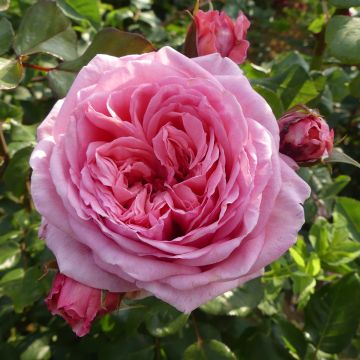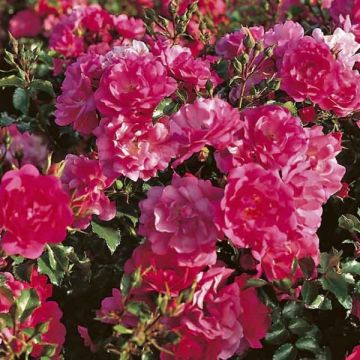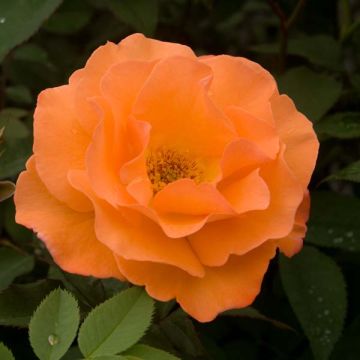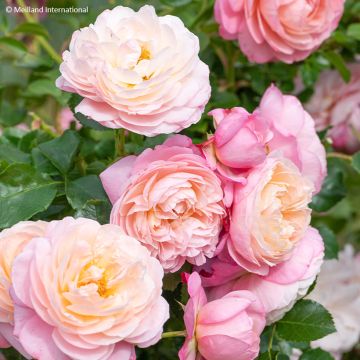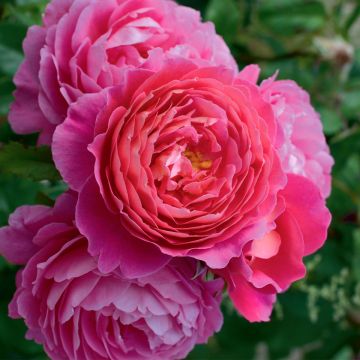

Rosier à pétales comestibles Birthday Rose Bio
Rosa x floribunda Birthday Rose Bio
Rosa x floribunda Birthday Rose® Bio
Received in good condition, looking forward to seeing it grow.
natacha, 13/02/2024
Special offer!
Receive a €20 voucher for any order over €90 (excluding delivery costs, credit notes, and plastic-free options)!
1- Add your favorite plants to your cart.
2- Once you have reached €90, confirm your order (you can even choose the delivery date!).
3- As soon as your order is shipped, you will receive an email containing your voucher code, valid for 3 months (90 days).
Your voucher is unique and can only be used once, for any order with a minimum value of €20, excluding delivery costs.
Can be combined with other current offers, non-divisible and non-refundable.
Home or relay delivery (depending on size and destination)
Schedule delivery date,
and select date in basket
This plant carries a 6 months recovery warranty
More information
We guarantee the quality of our plants for a full growing cycle, and will replace at our expense any plant that fails to recover under normal climatic and planting conditions.
Description
Rosa Birthday Rose is an organic rose bush with. It is as ornamental as it is delicious. It produces medium-sized, fully double, old-fashioned style roses that are clustered in bouquets. They boast a lovely fresh pink colour and are pleasantly fragrant. Its flowers, buds, and edible petals are tasty and have a slightly citrus aroma, which works wonders in fruit salads, confectionery, jams, and jellies. This compact bush is naturally resistant to diseases. It blooms in successive waves from June to October. It is perfect in flower beds and pots. Its flowers are sublime in bouquets and can be used to decorate plates and festive cakes.
This small floribunda rose belongs to a new series called Gourmet Roses, selected for their natural disease resistance, compact growth, and fragrant and tasty flowers. These floriferous roses are adapted to organic cultivation. They provide an abundance of delicious and delicate flowers to use and enjoy in the garden, on a patio, and in the kitchen.
Birthday Rose forms a small bush measuring an average of 70cm (28in) in height and 40cm (16in) in width. Its growth rate is fast. Its thorny stems are covered with lush, dark green foliage that is resistant to diseases under proper growing conditions. The deciduous foliage falls in autumn. The flowers bloom tirelessly between June and October. They are medium-sized (7 to 8cm (3in)), cup-shaped, and organised in quarters like old-fashioned roses. Each one opens in a fairly bright pink colour, but quickly fades to a fresh pink and then a tender pink over the course of hours. The flowering takes the form of clusters with several flowers. Their fragrance is moderately pronounced, with a rural and fruity character, and is more noticeable in calm and warm weather.
Birthday Rose will create a charming small flower bed when planted in small groups of 3 to 5 plants alongside purple, white, blue, or mauve flowers. Pair it with annual delphiniums, perennial flax, lavender, or pink to white digitalis, for example. It will add a romantic touch to perennial flower beds and large borders. Roses go perfectly with catmints, lavender, bellflowers, paniculate baby's breath, and herbaceous or climbing clematis. You can plant it in front of taller shrubs or roses, or use it to fill the base of a small tree.
In the kitchen
Ideally, harvest in the morning. Harvest the petals when the flowers are almost fully open, but not faded (they quickly lose their aroma). Only consume flowers from untreated plants. You can use them in confectionery, to flavour jellies, jams, fruit salads, prepare syrup, or to flavour drinks.
Report an error about the product description
Plant habit
Flowering
Foliage
Botanical data
Rosa
x floribunda
Birthday Rose® Bio
Rosaceae
Cultivar or hybrid
Planting and care
Plant in a sunny or lightly shaded location. Roses are tolerant, but they don't like excessive limestone or acidity. They will adapt to any garden as long as the soil is well worked and rich enough. To plant your rose, work the soil by crumbling it and add fertiliser to the bottom of the planting hole (dried blood or dehydrated horn, for example). Water generously after planting to remove any air pockets. Water regularly for a few weeks to facilitate root growth.
Pruning perpetual roses is essential for flowering. At the end of winter, shorten the branches to 3-5 buds above the ground (at the lowest), choosing a bud pointing outward for a more elegant habit. Remove dead wood and unsightly branches. Prune at a slant above a bud.
Regularly remove faded flowers to encourage new blooms.
Planting period
Intended location
Care
-
, onOrder confirmed
Reply from on Promesse de fleurs
Similar products
Haven't found what you were looking for?
Hardiness is the lowest winter temperature a plant can endure without suffering serious damage or even dying. However, hardiness is affected by location (a sheltered area, such as a patio), protection (winter cover) and soil type (hardiness is improved by well-drained soil).

Photo Sharing Terms & Conditions
In order to encourage gardeners to interact and share their experiences, Promesse de fleurs offers various media enabling content to be uploaded onto its Site - in particular via the ‘Photo sharing’ module.
The User agrees to refrain from:
- Posting any content that is illegal, prejudicial, insulting, racist, inciteful to hatred, revisionist, contrary to public decency, that infringes on privacy or on the privacy rights of third parties, in particular the publicity rights of persons and goods, intellectual property rights, or the right to privacy.
- Submitting content on behalf of a third party;
- Impersonate the identity of a third party and/or publish any personal information about a third party;
In general, the User undertakes to refrain from any unethical behaviour.
All Content (in particular text, comments, files, images, photos, videos, creative works, etc.), which may be subject to property or intellectual property rights, image or other private rights, shall remain the property of the User, subject to the limited rights granted by the terms of the licence granted by Promesse de fleurs as stated below. Users are at liberty to publish or not to publish such Content on the Site, notably via the ‘Photo Sharing’ facility, and accept that this Content shall be made public and freely accessible, notably on the Internet.
Users further acknowledge, undertake to have ,and guarantee that they hold all necessary rights and permissions to publish such material on the Site, in particular with regard to the legislation in force pertaining to any privacy, property, intellectual property, image, or contractual rights, or rights of any other nature. By publishing such Content on the Site, Users acknowledge accepting full liability as publishers of the Content within the meaning of the law, and grant Promesse de fleurs, free of charge, an inclusive, worldwide licence for the said Content for the entire duration of its publication, including all reproduction, representation, up/downloading, displaying, performing, transmission, and storage rights.
Users also grant permission for their name to be linked to the Content and accept that this link may not always be made available.
By engaging in posting material, Users consent to their Content becoming automatically accessible on the Internet, in particular on other sites and/or blogs and/or web pages of the Promesse de fleurs site, including in particular social pages and the Promesse de fleurs catalogue.
Users may secure the removal of entrusted content free of charge by issuing a simple request via our contact form.
The flowering period indicated on our website applies to countries and regions located in USDA zone 8 (France, the United Kingdom, Ireland, the Netherlands, etc.)
It will vary according to where you live:
- In zones 9 to 10 (Italy, Spain, Greece, etc.), flowering will occur about 2 to 4 weeks earlier.
- In zones 6 to 7 (Germany, Poland, Slovenia, and lower mountainous regions), flowering will be delayed by 2 to 3 weeks.
- In zone 5 (Central Europe, Scandinavia), blooming will be delayed by 3 to 5 weeks.
In temperate climates, pruning of spring-flowering shrubs (forsythia, spireas, etc.) should be done just after flowering.
Pruning of summer-flowering shrubs (Indian Lilac, Perovskia, etc.) can be done in winter or spring.
In cold regions as well as with frost-sensitive plants, avoid pruning too early when severe frosts may still occur.
The planting period indicated on our website applies to countries and regions located in USDA zone 8 (France, United Kingdom, Ireland, Netherlands).
It will vary according to where you live:
- In Mediterranean zones (Marseille, Madrid, Milan, etc.), autumn and winter are the best planting periods.
- In continental zones (Strasbourg, Munich, Vienna, etc.), delay planting by 2 to 3 weeks in spring and bring it forward by 2 to 4 weeks in autumn.
- In mountainous regions (the Alps, Pyrenees, Carpathians, etc.), it is best to plant in late spring (May-June) or late summer (August-September).
The harvesting period indicated on our website applies to countries and regions in USDA zone 8 (France, England, Ireland, the Netherlands).
In colder areas (Scandinavia, Poland, Austria...) fruit and vegetable harvests are likely to be delayed by 3-4 weeks.
In warmer areas (Italy, Spain, Greece, etc.), harvesting will probably take place earlier, depending on weather conditions.
The sowing periods indicated on our website apply to countries and regions within USDA Zone 8 (France, UK, Ireland, Netherlands).
In colder areas (Scandinavia, Poland, Austria...), delay any outdoor sowing by 3-4 weeks, or sow under glass.
In warmer climes (Italy, Spain, Greece, etc.), bring outdoor sowing forward by a few weeks.































